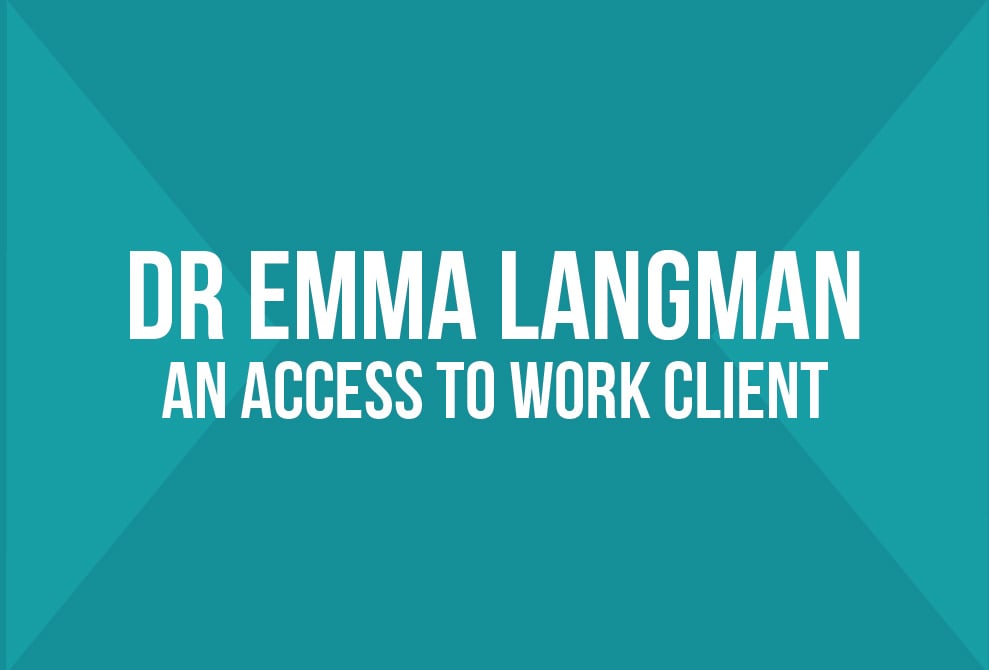Proudly Supporting Dr Emma Langman
Until this spring, Emma Langman was one of two directors of a small company specialising in providing innovative solutions in various sectors. She found themselves facing significant challenges as a result of her ADHD. This included managing time efficiently and becoming overwhelmed by the complexities of running a business as well as undertaking client work. Emma spoke to Access to Work, who carefully assessed her case and recognised that having a support worker would be the difference between her thriving at work or becoming burnt out, anxious and overwhelmed. Her company approached SmartPA to seek help for Emma so that she could overcome these challenges.
In this case study, we explain how SmartPA's tailored solutions transformed the employer’s working practices, allowing Emma and her company to thrive professionally, thanks to support specifically tailored for individuals living with the additional challenges that many neurodivergent people face.

"By saving the company approximately 2 hours each day in administrative work, SmartPA in fact saved me between 4 and 6 hours as these are tasks I find difficult and stressful."
Dr Emma Langman
The Challenge
Emma was finding that managing their inbox, calendar, and other administrative tasks at the same time as attempting to balance multiple deadlines was extremely challenging. The resulting constant stress and anxiety threatened her ability to perform effectively; and (as a tiny organisation) was a risk to her company’s reputation.
Recognising the necessity of external support to alleviate the burden of administrative tasks and to sustain performance, the company sought assistance from SmartPA to help Emma as an Access to Work client.
Why SmartPA?
.jpg?width=2000&height=1334&name=SmartPA%202-45%20(1).jpg)
Emma needed support tailored to her specific requirements. These requirements included an understanding of neurodiversity and a need for a structured approach. SmartPA's commitment to accommodating the needs of individuals managing disabilities made it the ideal choice.
Since she is also Autistic, Emma needs structure and routine, and changes can cause her stress and cost her valuable energy. She therefore particularly valued SmartPA's unique pod structure, which ensures continuity of service even during staff transitions.
Not only did SmartPA's awareness of neurodiversity support Emma’s specific needs, but our culture also aligned perfectly with her organisation’s values and goals.
How does Dr Emma Langman use SmartPA?
SmartPA's support significantly alleviated Emma's administrative burden, allowing her to put in successful weekly and daily routines, and focus on core business activities rather than low value but high effort tasks that had previously been causing her distress and lost time.
Weekly update meetings and proactive planning sessions ensured clarity and efficiency in task management. Emma favoured a four-week lookahead with our team, ensuring that every invitation and meeting was clearly described in her diary, with clear travel time, travel options and downtime to work, prepare, rest and reset between meetings.
Our tailored, structured approach also enabled Emma to navigate her workload seamlessly while mitigating the challenges associated with ADHD and other disabilities.
The Results
The impact of SmartPA's support on Emma’s wellbeing and productivity was profound. By saving the company approximately 2 hours each day in administrative work, they in fact saved Emma between 4 and 6 hours as these are tasks she finds difficult and stressful.
SmartPA effectively reduced stress and enhanced productivity. This newfound efficiency enabled both directors to concentrate on value-adding tasks, contributing to the company's growth and success.
Our client also found that SmartPA’s assistance facilitated timely payments, client follow-ups and improved business organisation, resulting in tangible benefits for the company.

Conclusion
Emma’s experience with SmartPA highlights the importance of tailored administrative support for Access to Work clients, helping them to focus on core activities and, ultimately, to unleash their potential. By addressing specific challenges and fostering a structured work environment, SmartPA enabled Emma’s company to overcome what had previously been obstacles to its business growth and success. The partnership between Emma, her co-director and SmartPA not only enhanced productivity and efficiency but also contributed to her personal and professional well-being.
This case study underscores the significance of strategic collaboration in achieving both business success and individual fulfilment, particularly for Access to Work clients managing neurodiversity.
The end of the story is that having spent 7 consecutive years working in self-employment or small start-ups, Emma’s confidence to manage her neurodiversity grew significantly and, with the agreement of her co-director, she has now moved on to the next step of her career. She is currently thriving in a senior role in a multinational consultancy, where she specialises in strategy and organisational transformation. The confidence that working with SmartPA as an Access to Work client gave her, has helped her to move forward in her career as a confident, happy, effective, and highly respected openly neurodivergent senior leader. We are proud to have been part of that journey.
